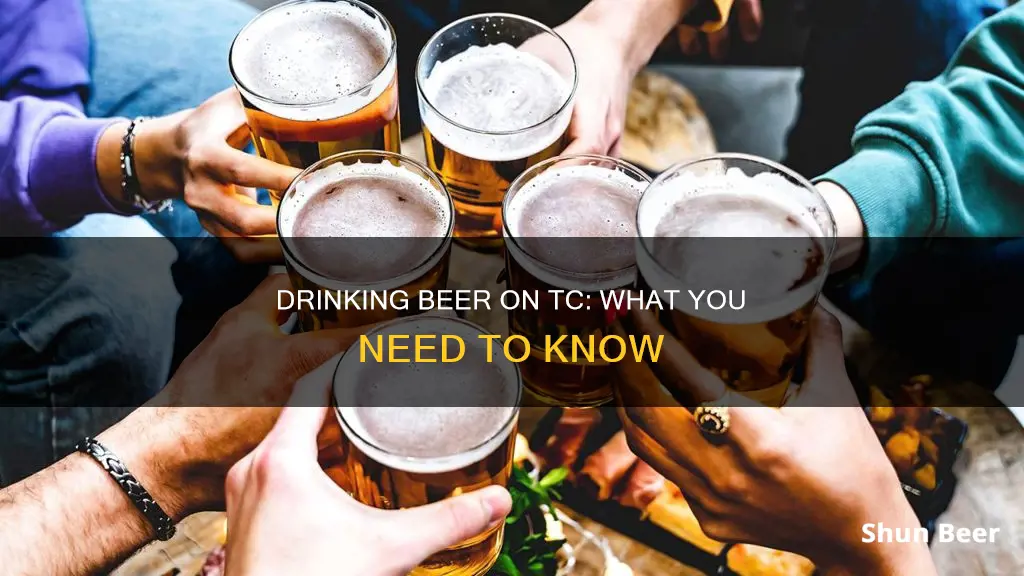
Beer commercials have long been a source of entertainment for viewers, with their amusing narratives and creative approaches to promoting alcoholic beverages. However, one notable aspect is the absence of actors physically drinking the beer. This has led to questions about whether there are regulations prohibiting the consumption of beer on television. Interestingly, the restriction is not imposed by federal law or a national broadcasting standard but is rather a self-imposed rule by the television networks themselves. While the Federal Communications Commission (FCC) has confirmed that there is no government prohibition on broadcasting alcohol consumption, the networks have chosen to maintain this long-standing tradition, with some even stating that they frown upon public displays of ingestion. This unwritten rule has become an industry standard that advertisers must navigate to ensure their commercials air across different networks.
| Characteristics | Values |
|---|---|
| Can a person drink beer on TV? | No |
| Who decides this? | TV networks |
| Is it a law? | No |
| Is it an FCC rule? | No |
| Is it an NAB rule? | No |
| Is it a Beer Institute rule? | No, but they advise against it |
What You'll Learn

Beer commercials and the absence of beer consumption
Beer commercials are known for their absence of beer consumption. While these commercials often showcase people having fun and enjoying social activities, you won't see them actually drinking the beer. This intriguing phenomenon has sparked curiosity among viewers, who wonder if there's a legal or regulatory reason behind it.
The absence of beer consumption in commercials is not due to a federal law or FCC regulation. In fact, the Federal Communications Commission, which oversees decency and broadcasting rules, has stated that there is no FCC rule or policy prohibiting the advertisement of alcoholic beverages. So why don't we see people drinking beer in these commercials?
The answer lies with the television networks themselves. Each network has the autonomy to set its own standards and regulations. When it comes to beer commercials, they generally frown upon displaying the ingestion of alcohol on screen. This long-standing rule is something that the networks have adhered to for decades, and it is taken seriously by brewers and advertisers alike.
The Heineken beer company once created an ad campaign that humorously addressed this very issue. In the ad, actor Neil Patrick Harris attempts to drink a Heineken Light on camera, only to be stopped by the director who cites "regulatory things" as the reason. While the ad pokes fun at the situation, it also highlights the real-world constraints that advertisers must navigate when creating beer commercials.
While some networks are beginning to reconsider this rule, the self-regulation by the television networks has been effective in shaping the content of beer commercials. As a result, advertisers have become adept at conveying their message without explicitly showing beer consumption, relying on creative strategies to engage and influence viewers.
Miami Beach Beer Drinking: What's Allowed?
You may want to see also

The Heineken ad with Neil Patrick Harris
Heineken's 2017 "Best Tasting Light Beer" campaign for Heineken Light featured actor Neil Patrick Harris in a series of three 15-second TV commercials. The campaign marked Harris's fourth consecutive year as a brand spokesperson for the beer company.
The first commercial, titled "Hypnotize", begins with Harris stating that many believe it is impossible to brew a great-tasting light beer. Heineken Light, however, breaks this stereotype by using Cascade hops, which are commonly found in craft IPAs and are known to be the best hops grown in the United States. As the ad closes, Harris shifts to other impossible feats and attempts to hypnotize viewers with a Heineken Light bottle.
In another Heineken Light ad, Harris questions why there are rules prohibiting him from drinking on TV. During the ad, Harris tips a bottle to take a sip, only to find that the cap is still on. The director then informs him that there are "rules about drinking in the commercial" and that it is a "regulatory thing". Harris comically misses the director's point, asking if it is because the ad is airing during a children's program or something.
Harris's signature wit and light-hearted humour are on full display in these Heineken Light commercials, which air on various networks and digital platforms.
Sweet Drinks and Beer: A Healthy Mix?
You may want to see also

The regulatory thing
In the United States, there is no federal law or national broadcasting standard that prohibits or regulates the advertising of alcoholic beverages. However, there is a "regulatory thing" that prevents people from drinking beer in commercials. This rule originates from the television networks and is not a government regulation.
The Federal Communications Commission (FCC), the body responsible for decency and broadcasting rules, has stated that there are no FCC rules prohibiting the broadcast advertising of alcoholic beverages. Congress has not enacted any law prohibiting such advertising, and the FCC does not have a policy regulating it.
The broadcasting industry, on the other hand, has its own set of rules. The National Association of Broadcasters (NAB) allows each network to set its own standards, and they generally frown upon the public display of alcohol ingestion. This is a long-standing rule that has been in place for decades and is followed by most broadcasters to avoid stirring up calls for stricter laws.
The Beer Institute, the voice of brewers and distributors, also has its own voluntary guidelines. They state that advertising and marketing materials can show beer being consumed where permitted by media standards, but should not depict rapid, excessive, involuntary, or dared consumption.
While there is no federal law prohibiting alcohol advertising, broadcasters are advised to respect the industry advertising codes. Pushing the boundaries of these codes could lead to heavier regulation of the industry.
Wheat Beer: Unfiltered, Unsafe, or Undrinkable?
You may want to see also

The role of the Federal Communications Commission
While there is no law prohibiting the broadcast advertising of alcoholic beverages, beer commercials rarely show actors drinking beer. This is because of a "regulatory thing", as cited by a director in a Heineken commercial featuring Neil Patrick Harris. However, this regulation is not a government mandate but a long-standing rule imposed by television networks.
The Federal Communications Commission (FCC) is an independent federal regulatory agency that reports directly to Congress. Established by the Communications Act of 1934, the FCC is tasked with regulating interstate and international communications by radio, television, wire, satellite, and cable. Its jurisdiction covers all 50 states, the District of Columbia, and US territories. The FCC is led by five commissioners, appointed by the President and confirmed by the Senate for five-year terms, with the exception of filling an unexpired term. The President designates one commissioner to serve as chairman and chief executive officer.
The FCC is the primary authority for communications law, regulation, and technological innovation in the United States. Its responsibilities include:
- Promoting competition, innovation, and investment in broadband services and facilities
- Supporting the nation's economy by ensuring a competitive framework for the communications revolution
- Encouraging the best use of spectrum domestically and internationally
- Revising media regulations to accommodate new technologies while maintaining diversity and localism
- Providing leadership in strengthening the defence of the nation's communications infrastructure
The FCC's rules and regulations are published in Title 47 of the Code of Federal Regulations (CFR) and are available to the public. Most rules are adopted through a "notice and comment" rulemaking process, where the FCC considers public input before finalising rules. The FCC also provides leadership and support in areas such as public safety, homeland security, consumer information, and education.
Drinking Beer in Space: What's the Deal?
You may want to see also

The stance of the Beer Institute
The Beer Institute is the voice of brewers and distributors. The Institute's stance on drinking beer on TC is that, while there is no federal law or national broadcasting standard prohibiting it, the decision lies with the television networks themselves. The Beer Institute's members are reluctant to challenge the unwritten rule due to the potential risk of stricter laws being imposed.
Megan Kirkpatrick, the director of communications at the Beer Institute, stated that advertisers will be as conservative as possible to ensure their ads get past all the networks. She also highlighted that brewers have no desire to instigate a push for new legislation. Kirkpatrick affirmed that the self-regulation of the industry is preferable to strict government intervention, and that the current practice of showing people enjoying social events without depicting consumption will likely continue.
The Beer Institute's official guidelines on the matter are less stringent than the networks' standards. The Institute's guidelines state that "although beer advertising and marketing materials may show beer being consumed (where permitted by media standards), advertising and marketing materials should not depict situations where beer is being consumed rapidly, excessively, involuntarily, as part of a drinking game, or as a result of a dare."
The Institute's stance reflects a cautious approach to industry self-regulation, prioritizing the maintenance of the status quo over potential gains from more explicit depictions of beer consumption in advertisements. This position is influenced by the desire to avoid stricter government regulations and the potential backlash from depicting alcohol consumption on television, particularly to underage viewers.
Beer and Kidney Stones: Post-Surgery Drinking Explored
You may want to see also
Frequently asked questions
No, a person cannot drink beer on TV. While there is no federal law or national broadcasting standard or code that bans or regulates a broadcaster from advertising alcoholic beverages, the TV networks have their own regulations.
The networks' regulations are a long-standing rule that the broadcasting industry has set for itself. The rule is not enforced by the government, but it is just as effective.
Yes, a person can drink beer in a movie. However, the placement of alcohol products should be restricted to "R" and "NC-17" rated films or films with similarly mature themes.







